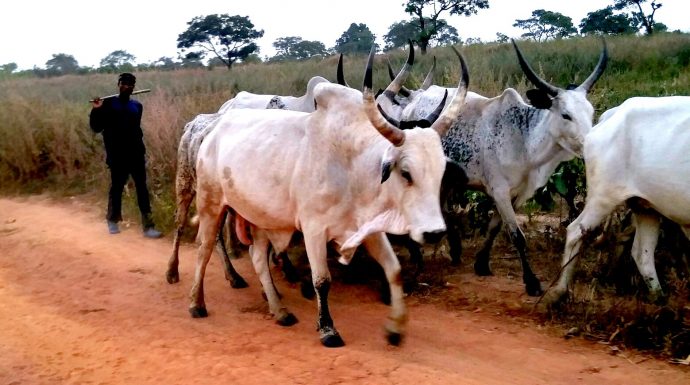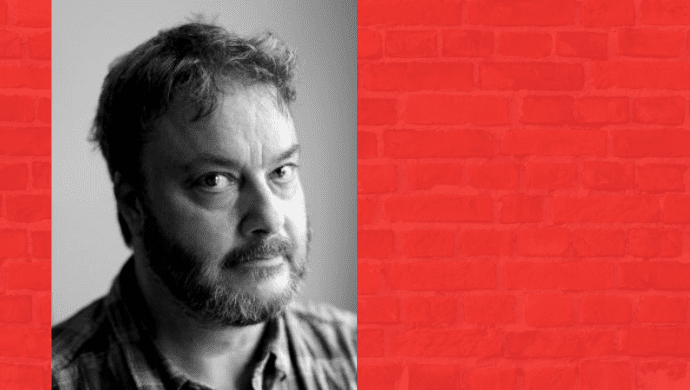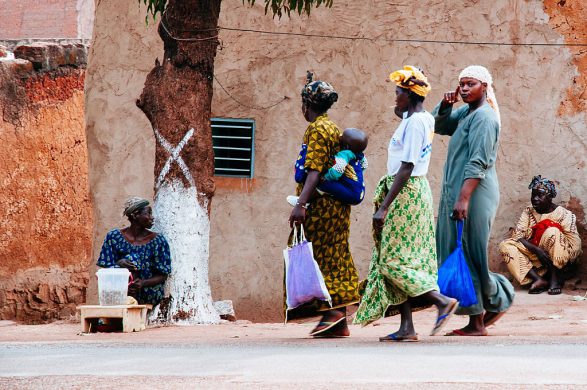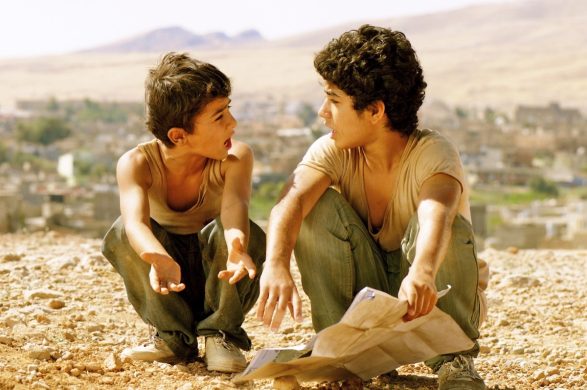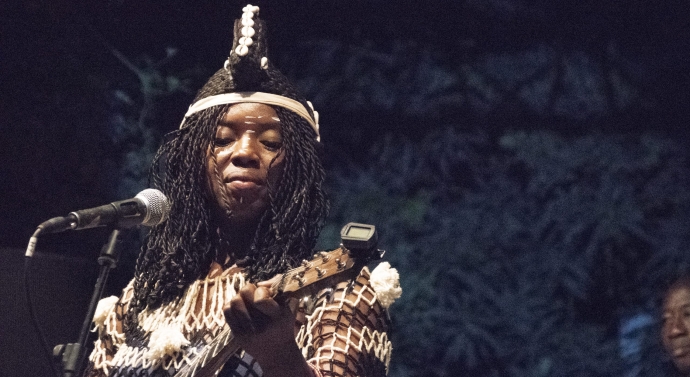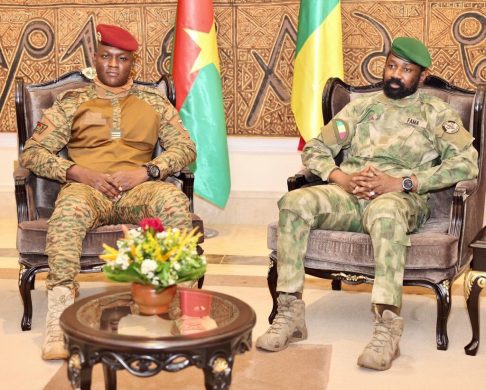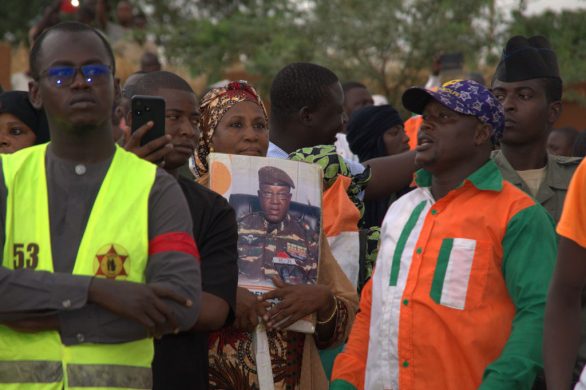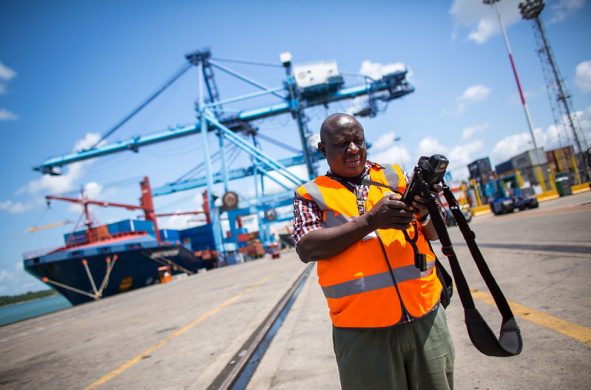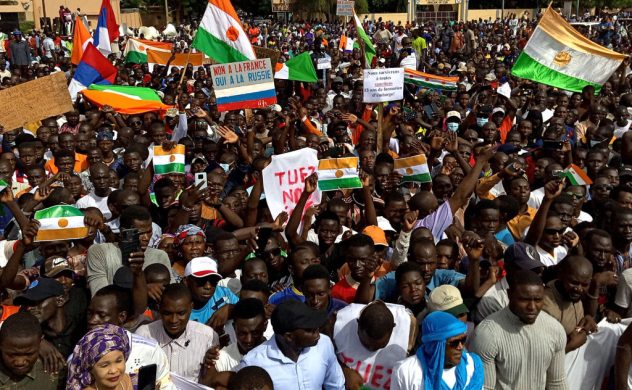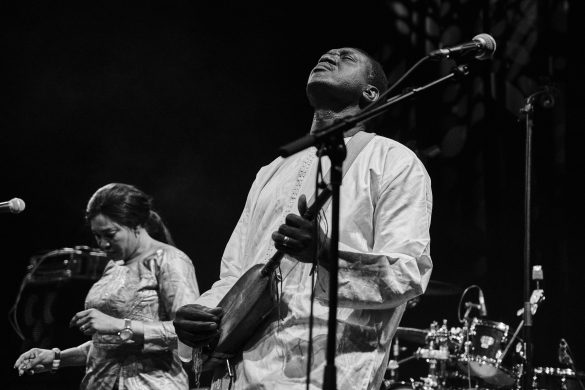“Please do not let your cattle eat our cashew nuts”
This plea was transmitted from a radio station in Filamana village to listeners in the wider southwestern Mali region.
Local farmers appealed to nomadic herders to stop cows trampling onto farmland, eating and destroying crops. At best, sounded the message: leave the region completely.
The radio station, Sigida Nyetaa (or “Environment Forward” in English), situated in Mali Folkecenter’s training centre in Filamana in southwestern Mali, is normally not engaged in conflicts between its listeners.
The station mainly works to sensitize the local populace about climate change, but on this particular day the two young radio reporters, who was responsible for the broadcast, Yusuf Koyate and Barry Koné, felt they had to relay “the sentiments of the people”.
They had not foreseen that the message, spread in an 85 kilometer’s diameter, would create such a commotion as it did.
The sous-prefect in Yanfolila heard it, was alarmed, got into his car and drove the 79 kilometer south-east to Filamana where he arrested the two young radio reporters. In the sous-prefet’s opinion the youngsters had violated broadcasting rules.
He took them to Yanfolila and put them in front of a judge who sentenced them to prison for “incitement to violence” and for “spreading illegal information”.
Luckily for the youngsters level-headed citizens intervened and instigated arbitrations between them, people from Filamana and the authorities in Yanfolila. Finally, all agreed that the reporters had gone a bit too far. The young men promised not to do it again. The verdict was withdrawn. They were set free to go home to Filamana.
Tense situation
The incident demonstrates how close to boiling point a conflict between resident farmers and nomadic cattle herders has come.
Mr. Daouda Sangaré, who is Mayor of Koussan Commune, under which authority is Filamana village, estimates that the situation is now so tense that “we are on the verge of bloodshed”. Therefore, a message that could excite already angry minds was not exactly what the village needed.
The mayor, like most people in Filamana, is painfully aware that the underlying cause for the conflict is climate change.
The cattle herders react to changing weather patterns: Lack of rain, droughts and desertification. With no water or grass the herders move their cattle to greener pastures.
The problem is that the current movement south make the herders trespass farmland, that, the mayor opines, belongs to farmers, not to the herders. “They can pass through, but they should not stay,” he says.
That is the core question of the conflict: who owns the land?
Resident farmers believe they do, and that was the sentiment that the radio station relayed to the listeners.
The herders, on their side, reckon that they adhere to age-old beliefs that allow them to move their cattle anywhere they want to graze for survival.
One conflict of many
Ironically, in Filamana, everybody, farmers and herders, come from the same ethnic group, the Fulanis. They share the same history, the same roots, are all predominantly Muslim. The difference between the two groups is that some have settled, while some maintain traditional Fulani nomadic life-style.
Filamana is not the only place in Africa where fights over land and water are escalating these days. Nomadic Fulanis are often on one side of a conflict for the plain reason that they are spread all over western and central Africa and as such the largest cattle-driving group in the world. In Africa they are increasingly on a southward move due to environmental degradation.
In Nigeria a conflict has been going on for several years and is now so violent that the think-tank, International Crisis Group, recently wrote in a report, that the “rising conflict between herders and farmers is six times deadlier in 2018 than Boko Haram’s insurgency”. The think-tank concluded that the root of the clashes in Nigeria, “lie in climate-induced degradation of pasture”.
Looming conflicts
Also, reports from the Democratic Republic of Congo tell about rising violence between herders and farmers. Here another Fulani nomadic group, the Mbororos, are involved. They drive their cattle across the border from the Central African Republic and, like in Mali, happen to trample over farmland, that the local population insist is their property.
And, Fulani herders have also started moving their cattle over the border from Mali, Burkina Faso and Niger to Ghana due to drought. New and dangerous conflicts with local farmers ensue in a country where Fulanis historically have made up only a very small part of the population.
Ghana National Association of Cattle Farmers recently told Reuters news agency that the association “recorded 104 deaths from farmer-herder clashes” in 2017 “the highest (number) yet, followed by 73 deaths in 2015”.
A powerful tool
Back in Filamana, the youngsters from radio Sigida Nyetaa will do their utmost to avoid situations like in Nigeria and Ghana, and work to ease the tension between farmers and herders with messages and programmes that advocate for peaceful negotiations.
“We realized how powerful a tool radio is”, as reporter Koyate puts it.
Read the report from International Crisis Group on the farmer-herder conflict in Nigeria here.
Read the Reuter report from Ghana here.
On the Fulani, short extract from Wikipedia
The Fula people or Fulani or Fulɓe
French: Peul
Are between 20 and 25 million people in total, one of the largest ethnic groups in the Sahel and West Africa. As an ethnic group, they are bound together by the Fula language and their Islamic religious affiliation, their history and their culture.
A significant proportion of the Fula – a third, or an estimated 7 to 8 million are pastoralists, making them the ethnic group with the largest nomadic pastoral community in the world.
Some prominent Fulas:
- The President of Nigeria, Muhammadu Buhari
- The President of Senegal, Macky Sall
- The President of Gambia, Adama Barrow
- Former President of Burkina Faso; Burkina Faso, Thomas Sankara
- Amadou Toumani Touré, Former President of Mali
- Soumaïla Cissé, Opposition Leader, Mali
- Baba Maal, musician, Senegal
The origins of the Fulani people are unclear and various theories have been postulated. Oral histories point toward a start in Egypt or farther east. Their language, though, suggests that they come from the Senegambian region
The Fulani follow a code of behavior known as pulaaku, which consists of the qualities of patience, self-control, discipline, prudence, modesty, respect for others (including foes), wisdom, forethought, personal responsibility, hospitality, courage, and hard work.
Recurrent droughts have meant that a lot of traditional herding families have been forced to give up their nomadic way of life. Increasing urbanization has also meant that a lot of traditional Fulani grazing lands have been taken for developmental purposes, or forcefully converted into farmlands.
The language of the Fulani is Pulaar. All Senegalese and Mauritanians who speak the language natively are known as the Halpulaar or Haalpulaar’en, which means « speakers of Pulaar ».
The full Wikipedia text on the Fulani can be found here: https://en.wikipedia.org/wiki/Fula_people
This is the third of a mini-series of articles from Mali Folkecenter’s intervention zone in southwestern Mali. Read about Bozo fisherfolk’s struggle for survival here and about gold-digging and pollution here.’
Artiklen er skrevet til og oprindeligt bragt på Mali Folkecenters netsted og bringes her efter aftale.

